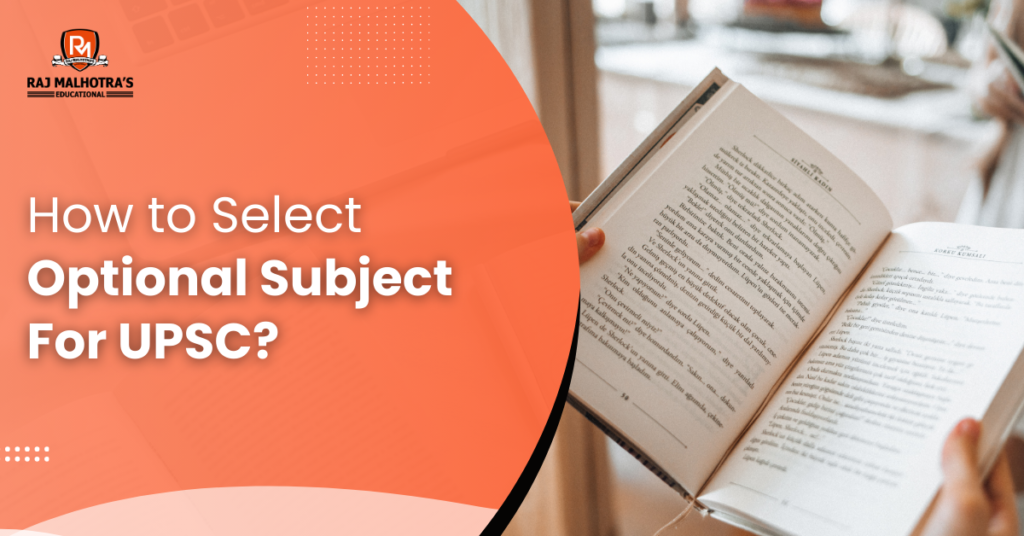Introduction:
Selecting optional for the UPSC Mains exam can be a little confusing task. Many aspirants get confused in the number of options available. Considering some of the right pointers while selecting mains optional is important.
In this Blog, Raj IAS academy, Best IAS coaching in Indore will guide you about the few pointers that are necessary to keep in mind while choosing the optional subject.
What is an Optional Subject in UPSC Mains Exam?
The UPSC Civil Services Examination includes a total of three stages. Or, You can say it has a total of three phases. The first one is the Prelims that is also known as the preliminary test. The second stage of the UPSC is the Mains that is subjective and theoretical in nature. The third one is the Interview stage which is also known as a personality test. In this the judging panel gives scoring according to one’s behavioural pattern. All UPSC candidates have to select one optional subject in the Mains stage. In addition to the necessary papers (such as General Studies and Essay). This optional subject consists of two papers. Each carrying 250 marks, for a total of 500 marks out of 1750 in the Mains.
UPSC offers a range of optional subjects that includes both literary and non-literature subjects choices for the candidates. Subjects like history, geography, sociology, anthropology, public administration, and more. Choosing an optional subject in the mains is crucial because it can affect your total exam performance.

Pointers that are necessary to keep in mind while choosing the optional subject:
Interest and Passion for the Subject
First and foremost if we talk, interest and passion plays a very crucial role in selecting an optional subject. Having interest in the subject can lead candidates to study this crucial subject without getting bored and losing interest. Studying the subject that actually excites the individual for the study will be helpful for the candidate.
Academic Background
Secondly, if you are having any academic background in the particular subject, it can also be proven helpful. Being familiar and knowing the subject a little bit with the subject and its topics will lead UPSC candidates to understand the concepts better and faster as compared to other subjects if they choose.
Overlap with General Studies (GS) papers
The next point you can consider is the overlap of subjects with general papers. As you know, some optional subjects overlap with the GS exam in UPSC Mains mostly. For example, subjects like History, Geography, Political Science and many others have themes in their syllabus that are also covered in the GS exam. This makes your preparation more efficient.
Availability of resources and genuine guidance
Considering the availability of genuine and easy access to resources and guidance for that particular subject you are choosing is also essential. Raj IAS Academy, the Best IAS coaching in Indore, provides subject expert guidance, who are in their field from the number of years with material for various optional subjects to their candidates.
Scoring Potential
Consider, if the subject you are choosing has scoring potential or not. While every optional subject has that potential within itself to get high grades, there is no subject where you cannot achieve good marks.There are still several subjects that have historically received better scores than others. This is due to their objective and the theoretical nature or simply the syllabus that makes them more scoring. To gain insights or know deeply about this, candidates can examine previous trends and the performance of the previous top performers.
The length and complexity of the syllabus
The next point you can consider is the length and complexity of the syllabus of the subject that you are choosing. Some subjects, such as History and Geography, have lengthy syllabuses, but others, such as Philosophy or Anthropology, are more concise in nature than the above subjects. Always analyse your ability to manage your time while balancing other aspects of the UPSC mains syllabus.
Performance in mock tests
The last point you can consider for choosing the optional subject is performance in mock tests. Before selecting an optional subject, always take a few mock examinations to assess your comfort and proficiency in that particular subject. This technique will help the UPSC candidates know exactly whether they are appropriate for the subject or not.
Conclusion:
Overall, we can say that selecting the appropriate and the right optional subject is an important stage in your UPSC preparation. It includes the careful analysis of your interests and passion you have, academic background if you have any, resource availability with the genuine coaching and guide, and potential score. Always remember, a well-chosen optional subject will lead you to enhance your confidence and help you do better in the UPSC Mains Exam as compared to other subjects if you choose.
At Raj IAS Academy, we not only provide excellent coaching for all levels of the UPSC test, but we also help students make informed decisions about their optional subjects. Choose the best with us.






